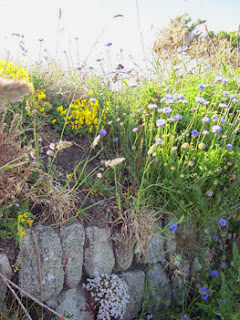This is what endures, materially speaking, relative to the transient nature of human lives, politics, individual suffering; or at least, this is what endures if the land and the other species who share our home planet aren't poisoned out of existence soon.
I say this as it looks like glyphosate, Roundup by any other name, that most ubiquitous and destructive of herbicides licensed by Monsanto, will be legal again (or still) from tomorrow.
It's useless to list the griefs visited on us by those who are out for profit, who have no joined-up thinking, or any sense of exactly what they're doing to the ecosphere and the larger picture; let alone any sense that a tug on any part of the web affects the whole.
I feel this dissociation of our species so keenly it's almost a continuing physical ache. It's a deeply painful grief, but pointless, unless it urges me to positive action (which I guess it does, come to think of it).
So I take refuge in the blackbird song at 4am today; the sweet wet strong scent of the escapee roses who have taken over yards and yards of our hedge; the fragrance of herbs in the green courtyard; the bright yellow frog I discovered in my herb and flower bed, camouflaged, perhaps, to hang out among the mass upon mass of yellow-flowered ground cover of Creeping Jenny, and doing a grand job of eating up the slugs and snails so that my peonies, hollyhocks, cornflowers and irises have actually flowered this year.
I take refuge in the parent robin who comes into the kitchen asking for food. I take refuge in the song of the little brook in the valley; in the fact that our once-mowed home meadow (that houses our woodland margin, orchard and large veg garden) is now beautifully full of a hundred (poetic licence) species of flowering grasses.
I take refuge in the fact that none of our neighbours uses Roundup. I take refuge in the fact that the local organic growers, Riverford, have now become such a big concern – and in the fact that their attitudes, and food, are not only so widely available but so widely purchased, though of course only by the relatively affluent, since organic food is still more expensive than that poisoned and grown on poisoned land. I take consolation in the spreading words of Guy Watson, Riverford veg box founder, in today's newsletter: '... real wisdom lies in appreciating untidy diversity; working with nature with minimal intervention rather than fighting it with mowers and herbicides.'
I take refuge in the nourishment of silence and solitude.
And I take nourishment from others' hearts and minds and the kindnesses and wisdoms to be found therein, whether in friends, family, strangers, on social media, or via those most consoling things, books.
And speaking of books, I take consolation in the little personal fact that, during a bad start to the morning, I received an email via my website from a very old friend in America from whom I haven't heard in ten years, and who gave me that inspiring book written on Cape Cod by Henry Beston, The Outermost House. B's email was to tell me how much he'd loved, and been moved by, my last novel, The Burning Ground, which he'd just read on Cape Cod. In a year when my writing has seemed to be on slowburn in terms of being out there in the world, this made me smile.
And in the veg garden, so slow to start this year, things are gradually picking up. What joy to be digging new potatoes, planting out (finally) the squash and courgettes. What joy to have the first small pick of broad beans, especially since they went in 6 months later than they should.
And as one cure for sadness is a giveaway, here's my recipe for broad beans for you:
- Pod and steam beans for 3 - 6 minutes, depending on size.
- Marinate hot in this mix: olive oil, soy sauce, grated root ginger, finely-chopped garlic, salt and ground pepper, chopped parsley.
- Eat cold.

























